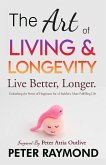Outlive - The Science and Art of Longevity by Peter Attia - A Comprehensive Summary The term "longevity" refers to the length of a person's life, which has recently gained increased attention and interest. Throughout history, people and societies have sought to live longer and healthier lives. The past century has seen significant advancements in science, medicine, and technology, leading to higher life expectancies, with many people now reaching their 80s, 90s, and even 100s. However, just living longer is not enough. It is important to ensure that those extra years are healthy, disease-free, and fulfilling. This concept is known as "healthy longevity," which has become a growing area of research in public health and healthcare. Why is Longevity Important? Prolonging life can improve the quality of life, reduce healthcare costs, and promote economic and social well-being. By promoting healthy longevity, people can live longer and more productive lives, contributing to society and their communities. It can also help families and healthcare systems deal with the effects of age-related illnesses such as dementia, cancer, and cardiovascular disease. Moreover, longer lifespans have significant economic implications. Social security and healthcare systems may face increased pressure as the population ages, and there may be a shortage of labor. By enabling people to continue functioning as productive members of society for longer periods, promoting healthy longevity can help mitigate these challenges. Longevity also has a substantial impact on relationships with friends and family. By living longer and healthier lives, people have the opportunity to spend more time with loved ones and develop deeper connections, which can lead to more social support, reduced feelings of loneliness and isolation, and improved mental health. In addition to individual decisions and actions, access to healthcare, education, and employment opportunities are part of the broader social context that affects longevity. To promote healthy aging for everyone, it is crucial to address these social factors that impact health. It is essential to stay informed on the latest research and evidence-based strategies as our understanding of the science of longevity evolves. By working together, individuals, healthcare professionals, and policymakers can help ensure that people can live longer, better, and more fulfilling lives through the promotion of healthy longevity. Here is a Preview of What You Will Get: ¿ A Detailed Introduction ¿ A Comprehensive Chapter by Chapter Summary ¿ Etc Get a copy of this summary and learn about the book.
Dieser Download kann aus rechtlichen Gründen nur mit Rechnungsadresse in A, B, BG, CY, CZ, D, DK, EW, E, FIN, F, GR, HR, H, IRL, I, LT, L, LR, M, NL, PL, P, R, S, SLO, SK ausgeliefert werden.









